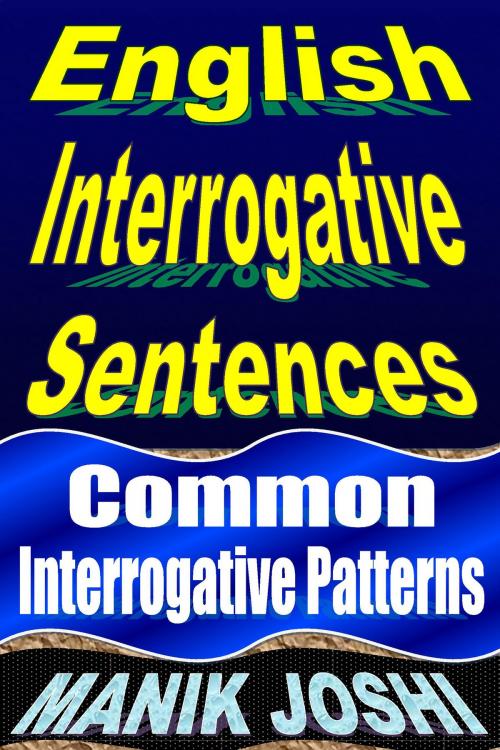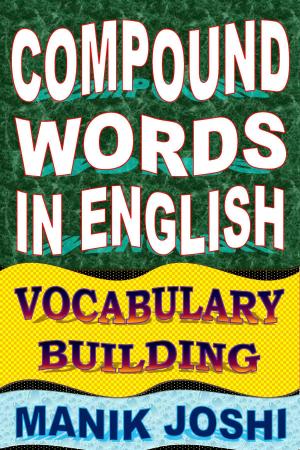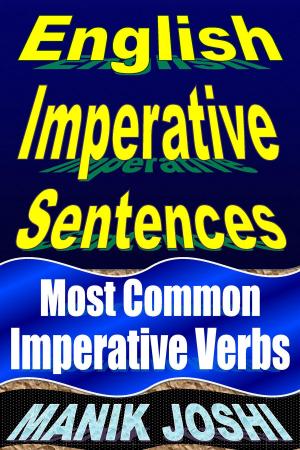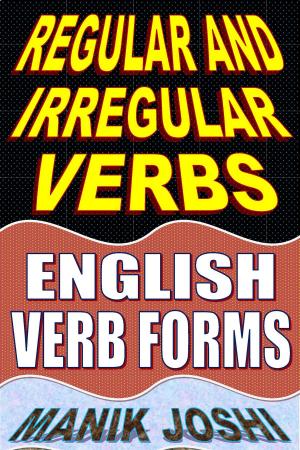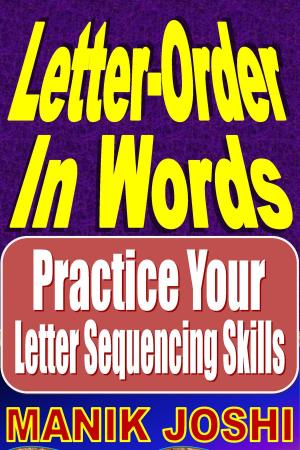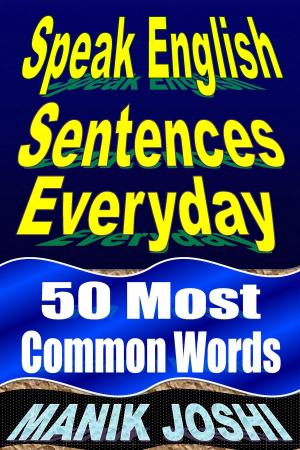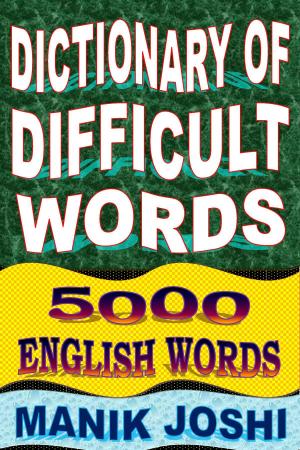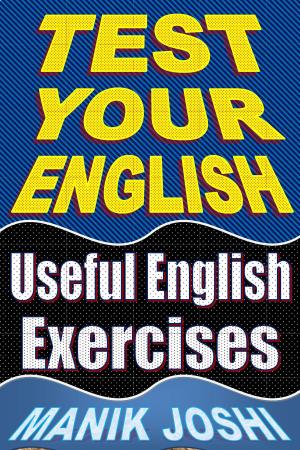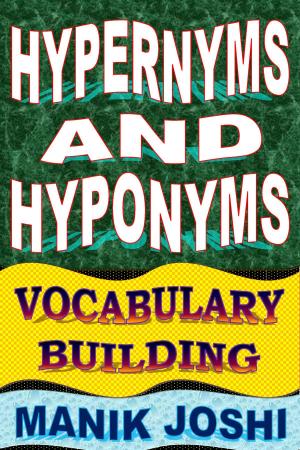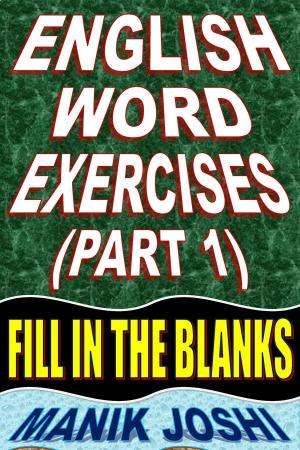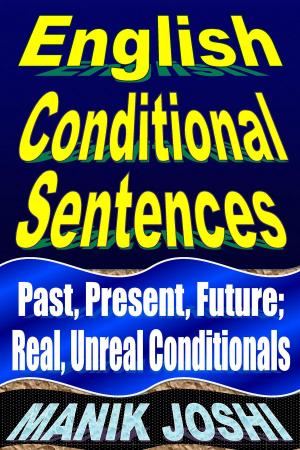English Interrogative Sentences: Common Interrogative Patterns
Nonfiction, Reference & Language, Study Aids, ESL, Foreign Languages| Author: | Manik Joshi | ISBN: | 9781301939046 |
| Publisher: | Manik Joshi | Publication: | February 8, 2013 |
| Imprint: | Smashwords Edition | Language: | English |
| Author: | Manik Joshi |
| ISBN: | 9781301939046 |
| Publisher: | Manik Joshi |
| Publication: | February 8, 2013 |
| Imprint: | Smashwords Edition |
| Language: | English |
This Book Covers The Following Topics:
What are “Interrogative Sentences”?
Structure (1) -- Wh-Question Word + Be/Do/Have/Modal
(1A). What + Be/Do/Have/Modal
(1B). When + Be/Do/Have/Modal
(1C). Where + Be/Do/Have/Modal
(1D). Which + Be/Do/Have/Modal
(1E). Who + Be/Do/Have/Modal
(1F). Whom + Be/Do/Have/Modal
(1G). Whose + Be/Do/Have/Modal
(1H). Why + Be/Do/Have/Modal
(1I). How + Be/Do/Have/Modal
Structure (2) -- Wh-Question Word + Word/Words + Be/Do/Have/Modal
(2A). What + Word/Words + Be/Do/Have/Modal
(2B). When + Word/Words + Be/Do/Have/Modal
(2C). Where + Word/Words + Be/Do/Have/Modal
(2D). Which + Word/Words + Be/Do/Have/Modal
(2E). Who + Word/Words + Be/Do/Have/Modal
(2F). Whom + Word/Words + Be/Do/Have/Modal
(2G). Whose + Word/Words + Be/Do/Have/Modal
(2H). Why + Word/Words + Be/Do/Have/Modal
(2I). How + Word/Words + Be/Do/Have/Modal
Structure (3) -- Wh-Question Word + Main Verb (Present or Past)
Structure (4) – Interrogatives Sentences – Be/Do/Have/Modal
(4A). Interrogatives Starting From – Am, Is, Are, Was, Were
(4B). Interrogatives Starting From – Do, Does, Did
(4C). Interrogatives Starting From – Have, Has, Had
(4D). Interrogatives Starting From – Modal Verbs
Structure (5) -- Question Tags
Structure (6) -- What if
Structure (7) – How Long/How Much/How Many
Structure (8) -- Wh-Question Word + To + Verb Word
Structure (9) – “What About” and “How About”
Structure (9) – “What About” and “How About”
Structure (10) – Alternative Questions
Structure (11) – Indirect Questions
Formation of Interrogatives from Affirmatives
Exercises
Sample This:
What are “Interrogative Sentences”?
Interrogative sentences are used to ask questions. An interrogative sentence ends with a question mark.
Most common interrogative words are as follows:
What, When, Where, Which, Who, Whom, Whose, Why, How
Interrogative words and what they refer:
What – refers ‘specific information’ or confirmation/repetition
When – refers ‘at what time’ or ‘on what occasion’
Where – refers ‘in what place, position or situation’
Which – refers ‘choice or alternative’
Who – refers ‘identity’ of a subject (person/people)
Whom – refers ‘identity’ of a object (person/people)
Whose – refers ‘who something belongs to’
Why – refers ‘reason, explanation or purpose’
How – refers ‘way or manner’, ‘condition or quality’
These words are called 'Wh-question words' because all these words contain letter ‘w’ and ‘h’. All these words (except ‘how’) even start from ‘Wh’.
NOTE: The following words are also used to ask questions:
Whatever, Whenever, Wherever, Whoever
These forms show ‘surprise, confusion, or emphasis.
Besides ‘Wh-question words’, Auxiliary Verbs ‘Be’, ‘Do’, ‘Have’, and ‘Modal Verbs’ are also used to form interrogative sentences. Following is the list of auxiliary and modal verbs:
Auxiliary Verb-- Be-- Am, Is, Are, Was, Were
Auxiliary Verb-- Do-- Do, Does, Did
Auxiliary Verb-- Have-- Have, Has, Had
Modal Verbs-- May, Might, Can, Could, Will, Would, Shall, Should, Must, Need, Used (To), Ought (To), Dare
You can begin sentences with these verbs to form Yes/No interrogative sentences.
(1A). What + Be/Do/Have/Modal
What is a good pet to give a five-year-old child?
What is a long way away?
What is a reasonable grocery budget?
What is age got to do with it?
What is all that?
What is Australia's national food?
What is behind nation's food shortages?
What is better for your company: happy staff or short-term profits?
What is Brazil to you?
What is going on in India?
What is going to take place over the next 90 minutes?
What is in the haze we are breathing?
What is it about the first day of the year that gets us so excited?
What is it and does it work?
What is it like to be sectioned?
What is it like to fly an Airbus A380?
What is it like to have won an unlimited supply of something?
What is it like to live in a hut?
This Book Covers The Following Topics:
What are “Interrogative Sentences”?
Structure (1) -- Wh-Question Word + Be/Do/Have/Modal
(1A). What + Be/Do/Have/Modal
(1B). When + Be/Do/Have/Modal
(1C). Where + Be/Do/Have/Modal
(1D). Which + Be/Do/Have/Modal
(1E). Who + Be/Do/Have/Modal
(1F). Whom + Be/Do/Have/Modal
(1G). Whose + Be/Do/Have/Modal
(1H). Why + Be/Do/Have/Modal
(1I). How + Be/Do/Have/Modal
Structure (2) -- Wh-Question Word + Word/Words + Be/Do/Have/Modal
(2A). What + Word/Words + Be/Do/Have/Modal
(2B). When + Word/Words + Be/Do/Have/Modal
(2C). Where + Word/Words + Be/Do/Have/Modal
(2D). Which + Word/Words + Be/Do/Have/Modal
(2E). Who + Word/Words + Be/Do/Have/Modal
(2F). Whom + Word/Words + Be/Do/Have/Modal
(2G). Whose + Word/Words + Be/Do/Have/Modal
(2H). Why + Word/Words + Be/Do/Have/Modal
(2I). How + Word/Words + Be/Do/Have/Modal
Structure (3) -- Wh-Question Word + Main Verb (Present or Past)
Structure (4) – Interrogatives Sentences – Be/Do/Have/Modal
(4A). Interrogatives Starting From – Am, Is, Are, Was, Were
(4B). Interrogatives Starting From – Do, Does, Did
(4C). Interrogatives Starting From – Have, Has, Had
(4D). Interrogatives Starting From – Modal Verbs
Structure (5) -- Question Tags
Structure (6) -- What if
Structure (7) – How Long/How Much/How Many
Structure (8) -- Wh-Question Word + To + Verb Word
Structure (9) – “What About” and “How About”
Structure (9) – “What About” and “How About”
Structure (10) – Alternative Questions
Structure (11) – Indirect Questions
Formation of Interrogatives from Affirmatives
Exercises
Sample This:
What are “Interrogative Sentences”?
Interrogative sentences are used to ask questions. An interrogative sentence ends with a question mark.
Most common interrogative words are as follows:
What, When, Where, Which, Who, Whom, Whose, Why, How
Interrogative words and what they refer:
What – refers ‘specific information’ or confirmation/repetition
When – refers ‘at what time’ or ‘on what occasion’
Where – refers ‘in what place, position or situation’
Which – refers ‘choice or alternative’
Who – refers ‘identity’ of a subject (person/people)
Whom – refers ‘identity’ of a object (person/people)
Whose – refers ‘who something belongs to’
Why – refers ‘reason, explanation or purpose’
How – refers ‘way or manner’, ‘condition or quality’
These words are called 'Wh-question words' because all these words contain letter ‘w’ and ‘h’. All these words (except ‘how’) even start from ‘Wh’.
NOTE: The following words are also used to ask questions:
Whatever, Whenever, Wherever, Whoever
These forms show ‘surprise, confusion, or emphasis.
Besides ‘Wh-question words’, Auxiliary Verbs ‘Be’, ‘Do’, ‘Have’, and ‘Modal Verbs’ are also used to form interrogative sentences. Following is the list of auxiliary and modal verbs:
Auxiliary Verb-- Be-- Am, Is, Are, Was, Were
Auxiliary Verb-- Do-- Do, Does, Did
Auxiliary Verb-- Have-- Have, Has, Had
Modal Verbs-- May, Might, Can, Could, Will, Would, Shall, Should, Must, Need, Used (To), Ought (To), Dare
You can begin sentences with these verbs to form Yes/No interrogative sentences.
(1A). What + Be/Do/Have/Modal
What is a good pet to give a five-year-old child?
What is a long way away?
What is a reasonable grocery budget?
What is age got to do with it?
What is all that?
What is Australia's national food?
What is behind nation's food shortages?
What is better for your company: happy staff or short-term profits?
What is Brazil to you?
What is going on in India?
What is going to take place over the next 90 minutes?
What is in the haze we are breathing?
What is it about the first day of the year that gets us so excited?
What is it and does it work?
What is it like to be sectioned?
What is it like to fly an Airbus A380?
What is it like to have won an unlimited supply of something?
What is it like to live in a hut?
